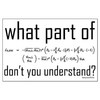Question 405260: Find 3 consecutive even integers such that three times the second equals 4 more than the sum of the first and the third
Found 2 solutions by IWork4Dessert, richard1234:
Answer by IWork4Dessert(60)   (Show Source): (Show Source):
You can put this solution on YOUR website! Every consecutive even or odd integer, no matter what it is, will be two greater than the number before it. 1, 3, 5... 100, 102, 104... 6, 8, 10... the second number is two greater than the first, the third number two greater than the second.
This being said, let the first number be "x", the second number be "x+2", and the third number be "x+4".
Stick them into an equation and voila, magic.
First read the problem up to the word "is" or "equals". One of those two words means that whatever comes next will be on the other side of the equation, after the equal sign.
"Find 3 consecutive integers such that three times the second..."
"...three times the second..."
So the first step is to take the second number, "x+2", and multiply it by three.
Since there are no other instructions for the left half of the equation, that's all you need to do.
3(x+2)=??
Now look at the other part of the problem.
"...equals 4 more than the sum of the first and the third."
You take the first variable(x) and the third variable(x+4) now and add them together.
3(x+2)=(x)+(x+4)+4
It also says that it "equals four more than the sum", which means you must add for as well.
3(x+2)=(x)+(x+4)+4
Now solve. Use PEMDAS(parentheses, exponents, multiplication, division, addition, subtraction) to solve the equation in the right order.
You cannot do parentheses first, since there aren't like terms within any of them, so begin with multiplication.
3(x+2)
Distribute the three inside the parentheses.
3x+6
3x+6=x+x+4+4
Combine all the x's first.
3x+6=2x+4+4
Now combine the numbers.
3x+6=2x+8
Choose which side you want to have your variable on. Your ultimate goal is to get it completely alone, without any other numbers before it or around it, on one side of the equation with your answer on the other.
For example's sake, I'll put it on the right.
Cancel out the variable on the left with the variable on the right.
6=-x+8
Subtract the 8 from the right side to get the variable alone.
-2=-x
Divide both sides by -1 to get rid of the coefficient(the number attached to the variable) away from the variable.
x=2
Now plug in your answer to the rest of the numbers.
x=2
x+2=4
x+4=6
You can check your answer by filling in the equation.
3(4)=2+6+4
12=8+4
12=12
And it works! Fireworks!
Hope this helps you out :)
Answer by richard1234(7193)   (Show Source): (Show Source):
You can put this solution on YOUR website! Suppose the even integers are x, x+2, x+4. Then, translating this into an algebra problem,
3(x+2) = 4 + (x + x+4)
3x + 6 = 8 + 2x
x = 2, so the integers are 2, 4, and 6.
|
|
|